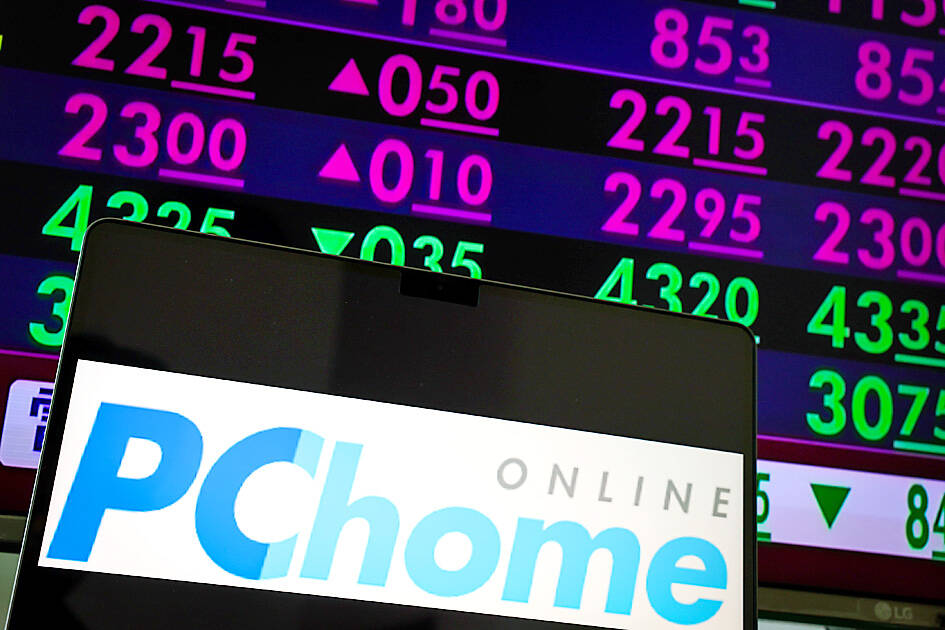PChome Online Inc’s (網路家庭) board of directors on Wednesday approved a private placement from Uni-President Enterprises Corp (統一企業), giving it a 30 percent stake in the e-commerce company.
In the deal, PChome would issue up to 61.69 million new common shares to Uni-President, which would become the largest institutional investor in the company, it said in a regulatory filing.
Uni-President, the nation’s largest food and beverage conglomerate, said in its regulatory filing on Wednesday that its board of directors had agreed to the private placement, which would allow it to secure two seats on PChome’s board.

Photo: CNA
The two companies did not disclose the total amount of the deal, which would be worth NT$1.96 billion (US$61.1 million) based on PChome’s closing share price of NT$31.75 on Wednesday.
The announcement helped push PChome’s share price up by the daily limit in Taipei trading yesterday, closing at NT$34.9, while Uni-President ended up 1.93 percent at NT$89.8, both outperforming the broader market’s 0.61 percent decline.
The private placement is expected to be completed after gaining shareholders’ approval in an extraordinary general meeting on Dec. 19, as well as regulatory approval, PChome said.
Unlike a public offering, an investor’s securities in a private placement are subject to a lockup period. Moreover, a private placement is considered to be more efficient and suitable for the company’s long-term planning while helping increase its working capital, PChome said.
Uni-President said the deal is part of its long-term investment plans. Last month, the company completed the acquisition of an 80 percent stake in Yahoo Taiwan Holdings Ltd’s (雅虎資訊) e-commerce business as it aims to increase sales from online stores and embrace the digital economy.
PChome has seen annual revenue drop in the past two years amid rising competition from rivals, and its cumulative revenue in the first three quarters of this year was down 8.55 percent year-on-year to NT$26.56 billion, the lowest level for the same period over the past six years.
The company has strengthened the sales of daily necessities, optimized its user interface that has been criticized for a long time, and reduced the number of loss-making subsidiaries after Alice Chang (張瑜珊) took over as chief executive officer in August 2022.
However, PChome’s performance remains weak compared with its peers such as Momo.com Inc (富邦媒體), which reported cumulative revenue of NT$79.09 billion in the first three quarters of this year, up 3.51 percent from a year earlier and marking the best result for the same period on record.
PChome reported NT$181.17 million in net losses for the first half of this year, with losses per share of NT$1.28. Prior to the September quarter, the company had posted 10 quarters of losses since the fourth quarter of 2021. In comparison, Momo.com reported NT$1.68 billion in net profit during the first half of the year, with earnings per share of NT$6.98.

Vincent Wei led fellow Singaporean farmers around an empty Malaysian plot, laying out plans for a greenhouse and rows of leafy vegetables. What he pitched was not just space for crops, but a lifeline for growers struggling to make ends meet in a city-state with high prices and little vacant land. The future agriculture hub is part of a joint special economic zone launched last year by the two neighbors, expected to cost US$123 million and produce 10,000 tonnes of fresh produce annually. It is attracting Singaporean farmers with promises of cheaper land, labor and energy just over the border.

US actor Matthew McConaughey has filed recordings of his image and voice with US patent authorities to protect them from unauthorized usage by artificial intelligence (AI) platforms, a representative said earlier this week. Several video clips and audio recordings were registered by the commercial arm of the Just Keep Livin’ Foundation, a non-profit created by the Oscar-winning actor and his wife, Camila, according to the US Patent and Trademark Office database. Many artists are increasingly concerned about the uncontrolled use of their image via generative AI since the rollout of ChatGPT and other AI-powered tools. Several US states have adopted

A proposed billionaires’ tax in California has ignited a political uproar in Silicon Valley, with tech titans threatening to leave the state while California Governor Gavin Newsom of the Democratic Party maneuvers to defeat a levy that he fears would lead to an exodus of wealth. A technology mecca, California has more billionaires than any other US state — a few hundred, by some estimates. About half its personal income tax revenue, a financial backbone in the nearly US$350 billion budget, comes from the top 1 percent of earners. A large healthcare union is attempting to place a proposal before

KEEPING UP: The acquisition of a cleanroom in Taiwan would enable Micron to increase production in a market where demand continues to outpace supply, a Micron official said Micron Technology Inc has signed a letter of intent to buy a fabrication site in Taiwan from Powerchip Semiconductor Manufacturing Corp (力積電) for US$1.8 billion to expand its production of memory chips. Micron would take control of the P5 site in Miaoli County’s Tongluo Township (銅鑼) and plans to ramp up DRAM production in phases after the transaction closes in the second quarter, the company said in a statement on Saturday. The acquisition includes an existing 12 inch fab cleanroom of 27,871m2 and would further position Micron to address growing global demand for memory solutions, the company said. Micron expects the transaction to